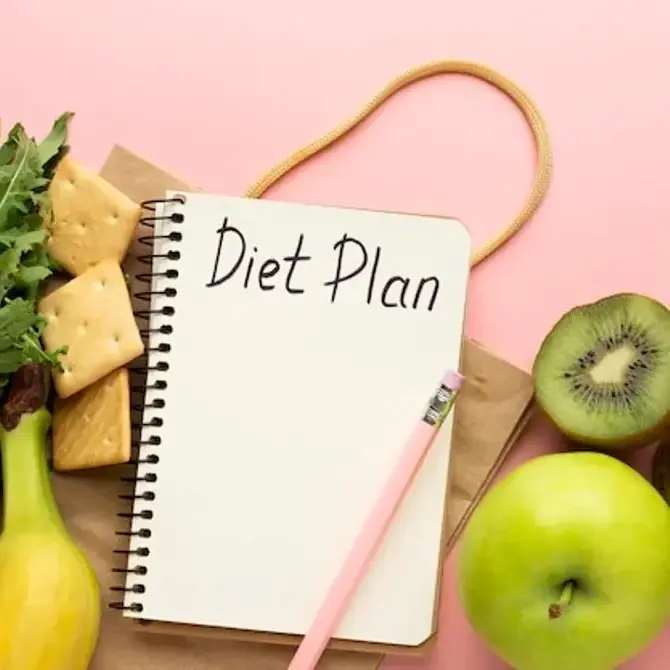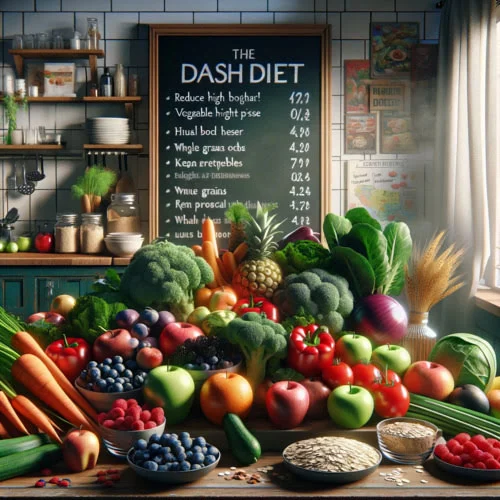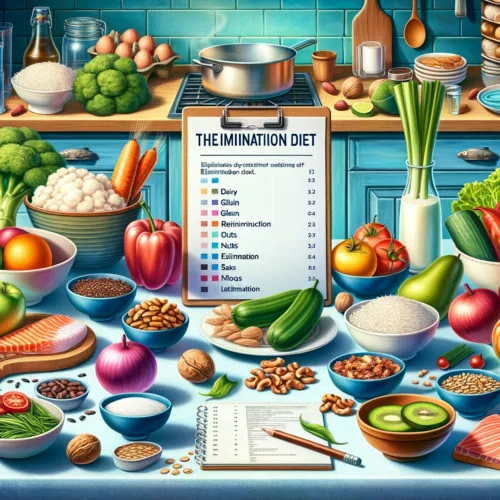Article hierarchy
- Why is a proper meal plan important to achieve weight loss goals?
- Diet for weight loss
- Useful tips for making a meal plan
- Importance of physical activity
- Monitoring progress and adjusting the plan
- Conclusions
For anyone who wants to lose weight, it is very important to know how to make a proper diet plan for weight loss. This process requires not only taking into account the individual needs of each person, but also balancing nutrients, controlling calories and taking into account personal preferences. How to make a proper meal plan for weight loss is a key question, as it determines the success and sustainability of the weight loss process. This article will provide you with important guidelines and useful tips to help you create an effective meal plan that meets your weight loss goals. Aspects such as setting goals and caloric deficits, designing your diet, physical activity recommendations, monitoring progress, and adjusting your plan will be covered. Gain the knowledge and tools you need to successfully achieve your weight loss goals and create a healthy and balanced lifestyle.
Why is a proper meal plan important to achieve weight loss goals?
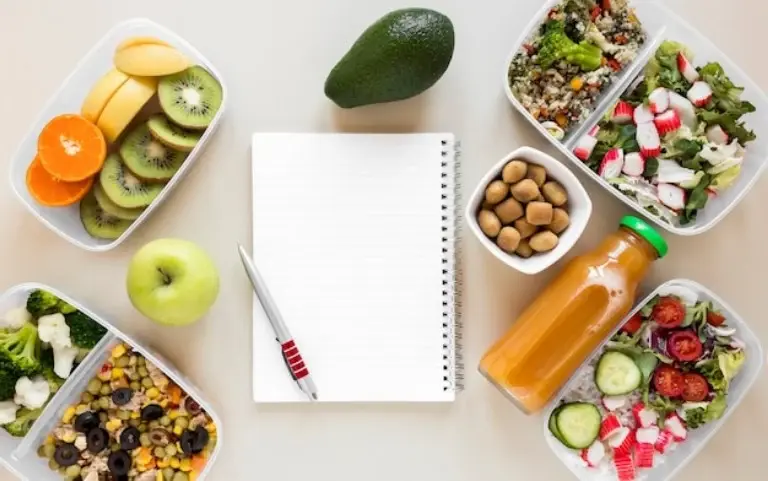
A proper meal plan is an important tool for achieving our weight loss goals. It helps us manage our caloric intake and control what we eat. A properly balanced diet provides the body with all the essential nutrients such as proteins, carbohydrates, fats, vitamins and minerals. This helps maintain our overall health and energy balance, which promotes gradual and sustainable weight loss.
Setting goals and determining a caloric deficit
Before making a meal plan for weight loss, it is important to define our goals. Clearly stated goals will help guide us and keep us motivated. One important aspect of a meal plan is to determine a caloric deficit. This means consuming fewer calories than we burn. When we are in a caloric deficit, our body begins to use fat stores as an energy source, which can contribute to weight loss.
1. define your weight loss goals
Before making a diet plan for weight loss, we need to clearly define how many pounds we want to lose and over what period of time. Setting specific and measurable goals will help us to be better guided and keep us motivated throughout the process.
2. Caloric deficit calculation
Calculating a caloric deficit is an important part of making a diet plan for weight loss. We can determine the number of calories we need to consume daily to create a deficit. This takes into account our activity level, metabolic rate, and weight loss goal. Calculating a caloric deficit will help us determine the optimal number of calories to consume to gradually but steadily lose weight.
You can calculate the number of calories you need by clicking on the “Calculate Calories” button at the top of the site.
Meal plan for weight loss – diet
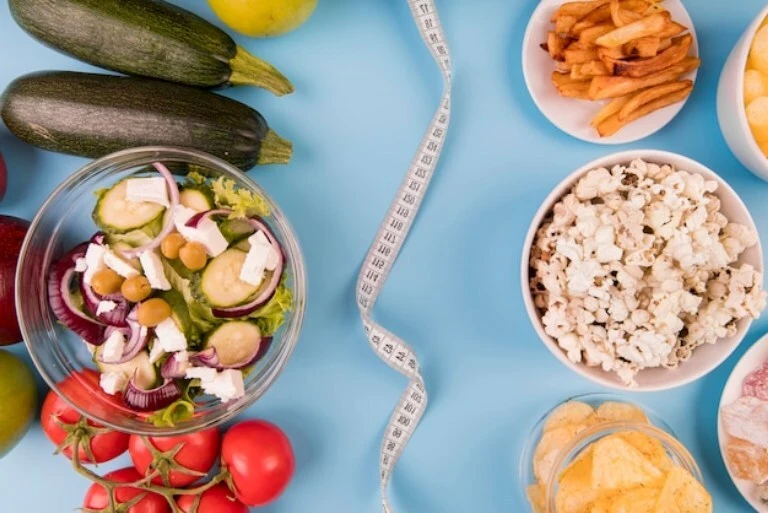
Diet plays an important role in achieving weight loss goals. There are several key aspects to consider when creating a diet plan for weight loss.
1. Correct ratio of macronutrients
The proper balance of macronutrients such as proteins, carbohydrates and fats is an important aspect of a weight loss diet. A moderate intake of proteins, carbohydrates and fats is recommended, with an emphasis on healthy and low-calorie options.
2. High quality protein sources
Including high quality protein sources in your diet is important for weight loss. Protein helps to control appetite, preserve muscle mass and speed up metabolism. It is recommended to consume protein-rich foods such as chicken, fish, eggs, tofu, buckwheat and legumes.
3. Complex carbohydrates and dietary fiber
Complex carbohydrates and dietary fiber are important for feeling satiety and stable blood sugar levels. They provide long-term energy and help control appetite. It is recommended to consume foods such as oatmeal, brown rice, whole grain bread, fruits and vegetables.
4. Healthy fats
Healthy fats are an important part of a weight loss diet. Fats can help control appetite and help absorb certain vitamins. It is recommended to consume healthy sources of fats such as olive oil, nuts, avocados and fish.
5. A variety of fruits and vegetables
Vegetables and fruits are rich in nutrients, low in calories and contain fiber, which promotes a feeling of satiety. It is recommended to include a variety of fruits and vegetables in your diet to provide your body with essential vitamins, minerals and antioxidants.
6. Correct fluid
A proper weight loss diet also includes proper fluid intake. Water plays an important role in metabolism and keeping the body hydrated. It is recommended to drink enough water throughout the day and limit the consumption of sugary drinks.
Making a weight loss diet that includes the right balance of macronutrients, high-quality protein sources, complex carbohydrates and dietary fiber, healthy fats, a variety of fruits and vegetables, and proper fluids will help you achieve your weight loss goals and maintain a healthy lifestyle.
Diet plan for weight loss – useful tips

Making an effective meal plan for weight loss can be easier if you consider the following helpful tips.
1. Plan and prepare meals in advance
Planning and preparing meals in advance will help you avoid the temptation to resort to unsatisfying food options. Preparing healthy meals and snacks in advance will allow you to meet your needs without resorting to having to buy unbalanced and unhealthy foods.
2. Follow the eating schedule
Eating regular and consistent meals is an important aspect of an effective weight loss diet plan. Try to stick to certain time intervals between meals. This will help to keep your blood sugar levels stable, control your appetite and prevent overeating.
3. Moderation and portion control
Moderation and portion control are key factors in a weight loss meal plan. Try to eat in moderation, listen to your body and stop eating when you feel full. Measuring portions and using small utensils can also help you control the amount of food you eat.
4. avoid processed foods and fast carbohydrates
When making a diet plan for weight loss, try to avoid processed foods and foods containing fast carbohydrates such as sweets, cookies, carbonated drinks and white bread. Instead, favor natural and uncooked foods, whole grain products, fresh fruits and vegetables.
5. Consider individual needs and preferences
Each person is unique and a meal plan should take into account individual needs and preferences. Consider your preferences for certain foods and meals, as well as possible restrictions or preferences due to health or religious beliefs. This will help you make the meal plan more personalized and enjoyable for you.
When creating a meal plan for weight loss, follow these helpful tips, including planning and preparing meals ahead of time, following a meal plan, moderation and portion control, avoiding processed foods and fast carbohydrates, and considering individual needs and preferences. This will help you create a healthy and balanced eating plan to help you achieve your weight loss goals.
Importance of physical activity

Physical activity plays an important role in achieving weight loss goals. It not only helps you burn calories, but also improves your overall fitness and health.
How physical activity helps in weight loss
Physical activity helps burn calories and speeds up metabolism, which affects weight loss. Exercise increases energy expenditure, helps preserve and strengthen muscles, and improves the cardiovascular system. It can also help improve mood and energy levels, which helps keep you motivated to reach your weight loss goals.
Physical activity recommendations
It is recommended that you include in your physical activity plan a variety of exercises that you enjoy and that suit your abilities. Combine cardio exercises such as walking, running, swimming or cycling. With strength training to strengthen your muscles. Gradually increase the intensity and duration of your workouts. Regularity is also important – try to engage in physical activity at least 3-4 times a week.
Consider your personal characteristics and health when choosing physical activity. If you have any health problems, talk to your doctor or physical activity specialist for guidance and personalized attention.
Monitoring progress and adjusting the plan

Progress monitoring and flexible plan adjustment are important components of a successful weight loss process. By allowing you to track changes and make adjustments as needed, progress monitoring helps you reach your goals more effectively and sustainably.
Keeping a food diary
Keeping a food diary is a great way to monitor what you eat and drink. Record all your meals, including portions and meal composition. This helps with conscious food consumption and tracking caloric intake. A food diary can also help you identify eating patterns, as well as identify habits or situations that may be influencing your eating.
Regular measurements and recording of results
Measuring and recording your results regularly helps you track your progress and keep you motivated. Use a scale or measuring tape to measure changes in weight, volume and body composition. Record this data regularly, such as once a week or every few weeks. This will allow you to see what changes are happening in your body and how close you are getting to your goals.
Adjusting the plan based on the body’s response
During the weight loss process, it is important to be prepared to adjust the plan based on your body’s response. If you encounter a plateau (stagnation) in weight loss or feel that the eating plan is not producing the results you expected. Changes may need to be made. Talk to a dietitian or nutritionist for guidance on necessary adjustments. For example, in caloric intake or meal composition.
Monitoring your progress and flexibly adjusting your plan allows you to customize your approach and achieve your desired weight loss results. Keeping a food diary helps you consciously monitor your food intake. And measuring and recording your results on a regular basis allows you to track your progress. In addition, being willing to adjust your plan based on your body’s response helps you overcome obstacles and reach your goals more effectively. Be aware of your progress. Flexibly adapt your plan and seek professional help to achieve the weight loss results you want.
Meal plan for weight loss – conclusions

A proper weight loss meal plan plays an important role in achieving weight loss goals. It includes setting goals, determining caloric deficit, choosing the right foods and portion control. In addition, physical activity and progress monitoring are also important for successful weight loss.
It is important to remember that every body is different and a nutrition plan should be customized to your needs and preferences. Consulting with a dietitian or nutritionist can be helpful in creating the most appropriate plan.
Focus on creating a balanced diet that provides all necessary nutrients and controls caloric intake. It is also important to pay attention to physical activity, which helps burn calories, strengthen muscles and improve overall fitness.
Monitoring progress and being willing to adjust your diet and exercise plan based on your body’s response are key to achieving sustainable weight loss.
And remember, losing weight is a process that takes time, patience and consistency. Set realistic goals, be disciplined and enjoy a healthy lifestyle.

